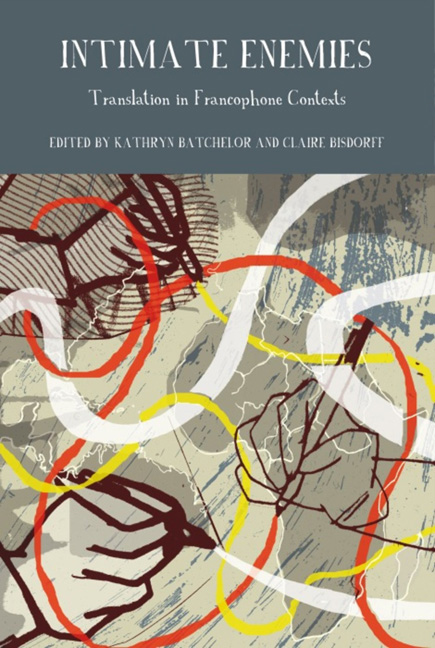Book contents
- Frontmatter
- Contents
- Illustration
- Acknowledgements
- Introduction: Translation – Formidable Enemy or Needed Friend?
- The Translation Market: Publishing and Distribution
- Writing and Translating in Practice
- Intimate Enemies: A Conversation between an Author and her Translator
- Translation: Spreading the Wings of Literature
- Translation – A Listening Art
- Ananda Devi as Writer and Translator: In interview with Julia Waters
- The Négraille's Testament: Translating Black-Label
- Translating Heterophony in Olive Senior's Stories
- Translation Challenges and New Avenues in Postcolonial Translation Theory
- Notes on Contributors
- Index
Ananda Devi as Writer and Translator: In interview with Julia Waters
from Writing and Translating in Practice
- Frontmatter
- Contents
- Illustration
- Acknowledgements
- Introduction: Translation – Formidable Enemy or Needed Friend?
- The Translation Market: Publishing and Distribution
- Writing and Translating in Practice
- Intimate Enemies: A Conversation between an Author and her Translator
- Translation: Spreading the Wings of Literature
- Translation – A Listening Art
- Ananda Devi as Writer and Translator: In interview with Julia Waters
- The Négraille's Testament: Translating Black-Label
- Translating Heterophony in Olive Senior's Stories
- Translation Challenges and New Avenues in Postcolonial Translation Theory
- Notes on Contributors
- Index
Summary
Ananda Devi is a prolific writer of novels, short stories and poetry. A Mauritian of Indian descent, Devi has lived and worked in France for over twenty years. Since 2000, her works have been published by Éditions Gallimard, first in their ‘Continents noirs’ (Black Continents) series, dedicated to literature from francophone Africa, and, since her award-winning Ève de ses décombres [Eve from her Rubble] (2006), in their main ‘Collection blanche’ (White Collection). Translation plays an interesting, paradoxical role in Devi's career: years of struggling to secure publishing contracts led Devi to seek a post as a professional translator for a United Nations organization, and so to juggle professional translation work with literary writing. Yet it was also translation that provided Devi with a belated entry into the mainstream French publishing scene, via her translation for Éditions Dapper of David Dabydeen's The Counting House (1996). Several of Devi's novels have been published in translation: Le Voile de Draupadi [Draupadi's Veil] (1993) in Italian; Moi, l'interdite [Me, the Forbidden Woman] (2000) in Hindi; Pagli (Mad Woman, 2001), in Italian, Spanish and, translated by the author herself, English; Soupir [Sigh] (2002) in Slovenian and Spanish; Ève de ses décombres in Romanian; and Indian Tango (2007) in Portuguese and English. Over the past decade, Devi has always been remarkably open and frank in her responses to my many questions about her work as both writer and translator. The following is a greatly abridged and translated selection from just a few of these exchanges. I am very grateful to Ananda Devi both for being so forthcoming with her answers to my questions and for giving permission to reproduce some of them here.
Publishing Trajectory
Julia Waters: You are well known for having started to write and win literary prizes at a young age. But it took you a long time to break into French publishing circles. Could you tell me a little about this trajectory?
Ananda Devi: My first collection of short stories was published at my own expense in Mauritius, when I was nineteen years old. At that age, I had already written about thirty short stories, three or four novels that I'd class as ‘juvenilia’, and many poems. In 1973, when I was fifteen, I won a literary prize for one of my short stories.
- Type
- Chapter
- Information
- Intimate EnemiesTranslation in Francophone Contexts, pp. 117 - 123Publisher: Liverpool University PressPrint publication year: 2013

